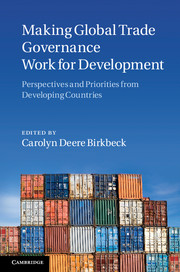 Making Global Trade Governance Work for Development
Making Global Trade Governance Work for Development Book contents
- Frontmatter
- Contents
- Figures
- Tables and boxes
- Contributors
- Acknowledgements
- Introduction
- Part I Global trade governance
- 1 Globalization, development and democracy
- 2 Trade, development and the UN Millennium Development Goals
- 3 The interactions of trade, macroeconomic policies and sustainability
- 4 Trade governance and sustainable development
- Part II Roles and responsibilities in global trade governance: diversity in developing country priorities and strategies
- Part III Strengthening multilateralism
- Part IV Making WTO negotiations and decision-making processes fairer
- Part V Conclusion
- Index
- References
1 - Globalization, development and democracy
from Part I - Global trade governance
Published online by Cambridge University Press: 07 September 2011
- Frontmatter
- Contents
- Figures
- Tables and boxes
- Contributors
- Acknowledgements
- Introduction
- Part I Global trade governance
- 1 Globalization, development and democracy
- 2 Trade, development and the UN Millennium Development Goals
- 3 The interactions of trade, macroeconomic policies and sustainability
- 4 Trade governance and sustainable development
- Part II Roles and responsibilities in global trade governance: diversity in developing country priorities and strategies
- Part III Strengthening multilateralism
- Part IV Making WTO negotiations and decision-making processes fairer
- Part V Conclusion
- Index
- References
Summary
‘We believe that the central challenge we face today is to ensure that globalization becomes a positive force for all the world’s people’, reads the fifth paragraph of the United Nations Millennium Declaration (United Nations 2000). Although globalization reflects technological advances and economic forces, it can be moulded by society and, particularly, by democratic political institutions. In fact, the form that globalization has been taking has been largely determined by explicit policy decisions.
In this sense, the most disturbing aspect has been the uneven and unbalanced character of the current phase of globalization and of the international policy agenda that accompanies it. The latter has both reproduced the traditional asymmetries in the world economy and created new ones. There are four issues that have dominated the economic agenda: free trade, intellectual property rights, investment protection, and financial and capital account liberalization. In the latter case, the condition that it should be subject to strong regulatory frameworks has been superimposed as a result of recent crises, particularly in the developing world by the 1997 Asian financial crisis and in the industrial world by the most recent 2008–9 global financial crisis. Moreover, in the area of international trade, liberalization is incomplete and asymmetric: various goods of special interest to developing countries are subject to the highest levels of protection and, in the case of agriculture, to subsidies in industrialized countries.
- Type
- Chapter
- Information
- Making Global Trade Governance Work for DevelopmentPerspectives and Priorities from Developing Countries, pp. 25 - 47Publisher: Cambridge University PressPrint publication year: 2011
References
- 2
- Cited by
